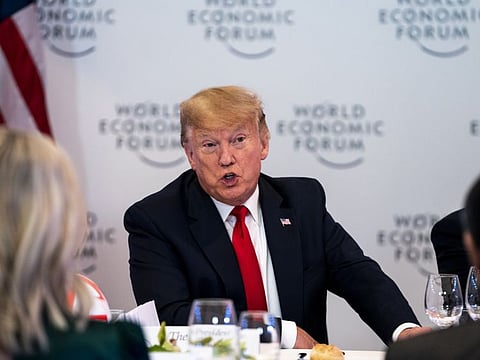President Trump’s art of the deal in the Middle East
What is unsettling is how Trump never views the region outside the context of money

Yet another book about Donald Trump is grabbing national attention and commanding headlines, this one dealing, in several parts of it, with how the American president views the role that the US military is playing in our region should generate handsome monetary rewards for Washington.
In January 2018, Michael Wolf’s sensational Fire and Fury: Inside the Trump White House, disabused us all of the notion that maybe, just maybe, the chief executive was not running a dysfunctional administration that schlepped along from crisis to crisis and from one fired government official to another.
After Trump dismissed Wolf’s book as worthless (it went on to become a best-seller) and threatened the author with litigation, he praised himself as being not just smart, but “a genius, and a very stable genius at that”.
Well, Carrol Leonnig and Philip Rucker, ‘Washington Post’ Pulitzer-winning reporters, have written a book, released this week, called, well, ‘A Very Stable Genius: Donald Trump’s Testing of America’, excerpts from which began appearing in the ‘Post’ last Sunday.
Where Wolf portrayed the workings of the administration, Leonnig and Rucker contextualise them. The book is as adequately sourced, as highly readable and as richly edifying as any penned by Bob Woodward, celebrated since the 1970s for ferreting out a Washington inside story and telling it compellingly.
Trump questioned why the United States couldn’t get some oil as payment for the troops stationed in the Gulf. “We spent $7 trillion, they’re ripping us off”, Trump boomed. “Where is the [expletive] oil?” I want to win. We don’t win anymore. We spend $7 trillion (Dh25.7 trillion), everybody else got the oil and we’re not winning anymore”Fawaz Turki
Pay for bases
What is particularly unsettling is how President Trump never views our region outside the context of money, and how much the United States could deliver from it to the Treasury Department. Consider in this context the authors’ description of a sobering meeting in June 2017, held in the Tank, a windowless vault at the Pentagon where the Joint Chiefs of Staff gather regularly to discuss classified matters, which Trump attended along with then Secretary of State Rex Tillerson, Secretary of Defence Jim Mattis and Director of the National Economic Council Gary Cohn, complete with their top aides.
They saw the encounter as a tutorial of sorts for a president who held an unorthodox, even simplistic world view. “Mattis, Tillerson and Cohn feared [that view] was rash, barely considered and a danger to America’s superpower standing”, wrote Leonnig and Rucker. For the next 90 minutes the trio used charts to discuss “the post-war international rules-based order”, which did not register with Trump, but when the term “military bases” was mentioned, in places like Iraq and Afghanistan, it “prompted him to launch in to say how ‘crazy’ and ‘stupid’ it was to pay for bases in some countries”.
South Korea? It should pay $10 billion for a missile defence system that the United States built for it. “We should charge them rent. We should make them pay for our soldiers. We should make money off of everything”.
Nato? “They are in arrears”, the president told Mattis. “We are owed money you haven’t been collecting”.
Afghanistan? “A loser war”, he told those present, all military folks. “You’re all losers. You don’t know how to win anymore”.
The Gulf states? Leonnig and Rucker write: “Trump questioned why the United States couldn’t get some oil as payment for the troops stationed in the Gulf. “We spent $7 trillion, they’re ripping us off”, Trump boomed. “Where is the [expletive] oil?” I want to win. We don’t win anymore. We spend $7 trillion (Dh25.7 trillion), everybody else got the oil and we’re not winning anymore”.
Also Read: Will America ever learn from history?
Also Read: Syria’s tragedy is a never-ending war
It’s all about money
The summation? “All these countries need to start paying for the troops we are sending to these countries,” he said, mangling his syntax “We need to be making a profit. We could turn a profit on this”.
The plan to tutor President Trump had backfired.
Lamenting this state of affairs, David Von Drehl, senior columnist for the ‘Washington Post’, wrote last Sunday: “There is no higher purpose in Trump’s approach to foreign policy: It’s all about the Benjamins. In the Middle East, we ought to ‘take the oil’, while in Europe and the Pacific we should be paid for the peacekeeping troops we’ve deployed. Foggy Bottom and the Pentagon should be profit centres”.
Tillerson and Mattis, along with countless other officials, have of course long since departed. “By then, however, Trump had become entirely unrestrained,” we read in this engrossing book. “He had replaced his raft of seasoned advisers with a cast of enablers who executed his orders and engaged his obsessions. They saw their mission as telling the president yes”.
Meanwhile, Donald Trump is attending a global economic forum in Switzerland, held in the popular ski resort of Davos — his first trip outside the United States since becoming the third president in American history to be impeached but the first to identify himself as a very stable genius.
— Fawaz Turki is a writer and lecturer who lives in Washington and the author of several books, including the Disinherited: Journal of a Palestinian Exile.
Sign up for the Daily Briefing
Get the latest news and updates straight to your inbox



